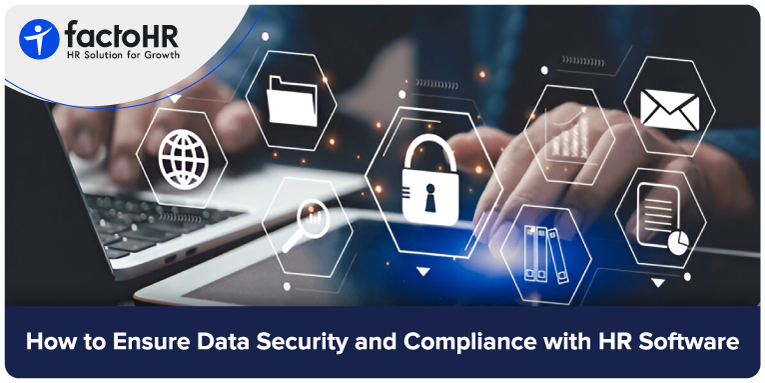How to Ensure Data Security and Compliance with HR Software?

Table of Contents
HR departments manage extensive employee data, such as payroll, attendance, medical records, and personal details. Since this information is sensitive, HR systems are frequent targets for cyberattacks and data breaches. Employees and the company may suffer serious consequences if unauthorized people access confidential information.
HR software simplifies daily tasks and efficiently manages employee data. It also safeguards that data, effectively protecting employees’ sensitive information.
This blog discusses how modern HR software protects employee data, ensures HR compliance, and establishes security measures to counter potential threats.
Why is Data Security Crucial in HR Software?
HR software stores vital employee data like IDs, salaries, and health records. It also includes confidential details such as performance reviews and financial information. Protecting this sensitive data is critical for every organization today. A data breach can harm a company’s image and employee trust. It may also lead to penalties under laws like GDPR or the DPDP Act. When data is not secure, employees may lose confidence and leave.
To avoid this, companies must follow strong security practices. These include role-based access, two-factor authentication, and data encryption. Keeping audit logs and checking systems regularly also helps reduce risks.
Regular training helps HR teams handle data safely and correctly. Transparency about security measures boosts employee trust and morale. Cyber threats are growing, so companies must stay alert and updated. Updating software and fixing weaknesses is key. Data security is more than compliance. It shows care for your people. When employee data is protected, trust grows, and the company culture stays strong.

What are the Key HR Compliance Regulations that You Need to Know?
Businesses in India must follow HR compliance rules to avoid legal troubles. These rules help create a safe, fair, and respectful work environment. Understanding and following them builds employee trust and protects the company. India’s labor laws focus on wages, workplace safety, employee benefits, and rights. Staying updated helps businesses avoid penalties and maintain a healthy work culture. Regular policy reviews ensure HR practices align with current rules.
Compliance is more than a legal duty; it reflects care for employees. Key laws include the Shops and Establishment Act and the Payment of Gratuity Act. These ensure fair treatment and proper benefits for long-serving staff, helping build a supportive and respectful workplace.
The Maternity Benefit Act protects expectant mothers’ rights at work.
By following these laws, businesses support a respectful workplace. They also reduce risks and focus on growth without legal concerns.
GDPR Compliance
Companies that handle employee or customer data internationally must follow GDPR rules to protect privacy and data rights.
SOC 2 / ISO 27001 Certifications
Companies must follow global standards for data security, and selecting ISO-certified HR software is crucial as it meets these standards.
Local Labor Laws
Organizations must adhere to PF ESI compliance within Indian labor laws to safeguard employee benefits, including Provident Fund contributions and medical insurance.
Shops and Establishments Act
In organizations, each state in India has its own version of managing working hours, leaves, holidays, and wage payments.
Payment of the Gratuity Act
The organization provides gratuity payouts to ensure the financial security of employees who have served for five years or more in the same organization after leaving the company.
The Maternity Benefit Act
The organization must follow this for female employees to ensure maternity leave and other benefits supporting a balanced and inclusive work environment.
POSH Act
Organizations provide a safe workplace by following the Prevention of Sexual Harassment (POSH) Act.
Staying updated and compliant in business management is easier with modern solutions that support HR compliance automation, offering a reliable way to align with legal regulations and streamline processes.

How does Modern HR Software Protect Data & Compliance?
Modern secure HR software with HR data encryption and employee data protection tools plays a vital role in managing confidential employee information and strengthening data protection and compliance.
Role-Based Access Controls
Secure HR software implements RBAC to grant authorized individuals access exclusively to certain employee information. By assigning roles and permissions, the risk of internal threats is reduced, and data exposure is better controlled.
End-to-End Encryption
Protect HR platforms by using encryption methods for HR data, ensuring storage and transmission safety. This ensures the data is encrypted, which means it remains unreadable to unauthorized users.
Cloud Security and Backup
Modern HR software provides secure cloud storage and regular data backups. It also offers quick recovery options to ensure sensitive HR information stays protected.
Two-Factor Authentication (2FA)
HR software systems provide 2FA that enables users to access HR systems using two forms of identification. This double layer of security significantly lowers the likelihood of unauthorized account access.
Automated Compliance Workflows
Compliance workflows in HR software simplify adherence to regulations like GDPR and local labor laws. They automate documentation required for compliance, manage consent, and update policies without manual effort.
Audit Trails and Activity Logs
Detailed HR audit trails track each action in the HR system, which helps observe suspicious business activities and maintain complete visibility for compliance checks.
Auto Logouts and Session Timeouts
HR software platforms help protect sensitive data by automatically logging out inactive users, reducing the threats of unauthorized access and inactive sessions.
Today’s HR solutions integrate advanced HR data encryption, strong authorization, employee data protection tools, and compliance tools to protect employees’ information against data breaches and weak access controls.

What are the Best Practices to Ensure Data Security with Modern HRMS?
Confidential information must be managed carefully to ensure data security with modern HRMS and proactively reduce threats. Data integrity must also be maintained through continuous monitoring and cybersecurity measures.
Choose vendors with strong certifications (SOC 2, ISO): Ensure the HRMS vendor complies with industry-standard certifications to guarantee secure data handling.
Train HR teams on data handling protocols: Educate HR teams about internal security protocols and data protection laws.
Regularly update software and patch vulnerabilities: Keep systems up to date to defend against new security threats.
Limit data access by role and need: To reduce vulnerability risks, restrict access to organizational information based on job roles and responsibilities.
Backup data regularly and test recovery: To prevent data loss, ensure the data is regularly backed up and test the recovery.

Conclusion
In today’s digital world, securing employee data is a critical priority. Modern HR software acts as a strong shield, protecting sensitive information through advanced encryption, role-based access, regular reports, and strict compliance with industry standards like GDPR and ISO. Investing in the right Human resource software helps organizations lower security risks, keep employee data safe, and create stronger and more encouraging bonds with their team members.
Choosing the correct partner makes all the difference. HR software offers a secure, reliable, and compliant HR platform. Organizations can manage employee data smoothly, stay compliant with regulations, and focus on their teams while ensuring all confidential information remains secure. If you are looking for an HR solution that simplifies your processes and keeps your data safe at every step, factoHR is the right choice. Schedule a free demo today.
What Kind of Data Security does HR Software Provide?
HR software provides data security through encryption, access controls, regular audits, secure cloud storage, and compliance with standards like ISO 27001, GDPR, and SOC 2.
Is Cloud-Based HR Software Secure?
Yes, cloud-based HR software is secure with strong security features like encryption and regular updates.
How Can HRMS Help with GDPR or ISO Compliance?
HRMS helps with GDPR or ISO compliance by securely managing employee data, ensuring proper data handling, and providing features for consent management and audits.
Grow your business with factoHR today
Focus on the significant decision-making tasks, transfer all your common repetitive HR tasks to factoHR and see the things falling into their place.

© 2026 Copyright factoHR


